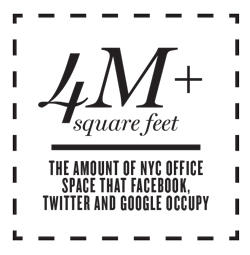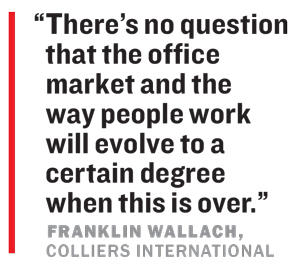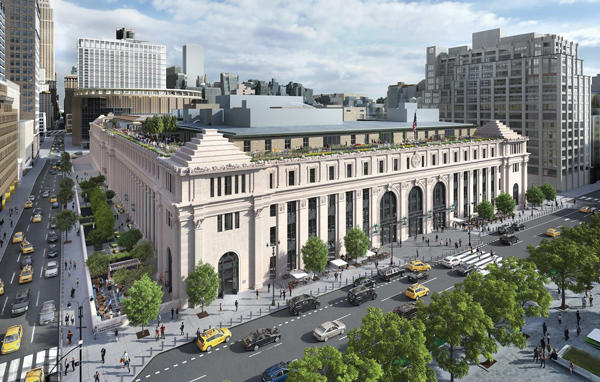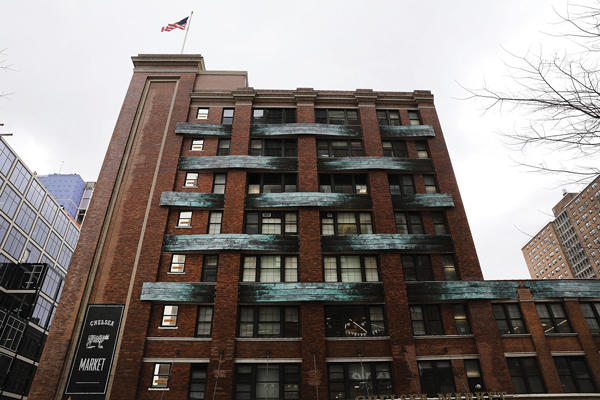Office landlords and leasing agents breathed a sigh of relief this month when Facebook inked a massive lease deal at Manhattan’s landmark Farley Post Office building.
The deal with Vornado Realty Trust for 730,000 square feet at the $1 billion-plus redevelopment — which includes new commercial space and the expansion of Penn Station — marks the biggest office lease since the pandemic turned the market into a virtual ghost town for months on end.
Come late 2021, Mark Zuckerberg’s online conglomerate will occupy all of the office space in the sprawling complex, though the terms of the deal were not disclosed. Vornado CEO Steve Roth touted in a statement that “Facebook’s commitment reinforces New York’s position as the nation’s second tech hub,” and Robert Cookson, who oversees real estate for the social media giant, said he and his colleagues “look forward to being a part of this iconic New York City landmark’s future for years to come.”
News of the company’s interest in the property broke last year, a few months before Facebook announced it was taking 1.5 million square feet of office space in three Hudson Yards buildings on Manhattan’s Far West Side.
But as the pandemic continues to raise questions about the need for large offices — especially for many tech companies that thrive in the cloud — there was much hand-wringing over whether the deal would go through. Facebook’s co-founder and CEO added to the uncertainty in late May when he announced that as many as half of the company’s 45,000 employees could transition to working remotely for the long haul. Other large companies, including Twitter, Quora, Zillow and Shopify, have made similar announcements in recent months, putting a big question mark over the tech industry’s appetite for new office space in prime real estate markets.
As the country’s great work-from-home experiment continues, the debate over the future of office leasing in New York and other major cities is far from over. There are still no clear answers on the long-term impacts of the pandemic, and that comes on top of the U.S. economy’s record decline in the second quarter of 2020.
Net absorption in the U.S. office market — the amount of total space leased minus new and vacated offices — fell to nearly 22 million negative square feet in the second quarter, a level not seen since the last recession, a recent report from CBRE found. That has had minimal impact on pricing in the Big Apple since the pandemic hit. But Manhattan, the country’s most expensive office market, started to show signs of a price decline in July, according to Colliers International.
 A survey of major employers by the Partnership for New York City, meanwhile, found that just 8 percent of their workers had returned to the office as of this month.
A survey of major employers by the Partnership for New York City, meanwhile, found that just 8 percent of their workers had returned to the office as of this month.
And with prime office space being subleased at steep discounts in some buildings, Donald Trump’s ongoing crusade to ban the popular video-sharing app TikTok cast a shadow over one of the other few bright spots in the Manhattan market. The fate of Beijing-based company’s U.S. office presence — including its recent lease for more than 230,000 square feet at the Durst Organization’s One Five One — is now up in the air.
But, in the long term, other tech and financial firms based in the U.S. could help fill a bigger void throughout Manhattan’s roughly 500 million square feet of office space, sources say. The Blackstone Group, IBM, Apple and other companies are reportedly looking to expand their New York office footprints, while JPMorgan Chase is moving forward with plans to replace its Midtown headquarters with a much taller tower on Park Avenue.
Many in the real estate business maintain that large companies will need even more space to make up for social distancing.
At the same time, office tenants are also trying to negotiate shorter and more flexible lease terms as they gauge what their office needs might be in a post-Covid era. WeWork, the shared office space provider that went through a world of trouble before the pandemic, for example, is now offering “On Demand” workspaces in Manhattan and Brooklyn — for as low as $29 a day and $10 an hour for a meeting room.
Franklin Wallach, senior managing director of New York research at Colliers, said it’s still too early to assess what the lasting effects of Covid-19 will be on office life in the city.
“There’s no question that the office market and the way people work will evolve to a certain degree when this is over,” Wallach noted. “But the New York City office market has evolved over decades and centuries from major events.”
Footprint matters
For many real estate players, TikTok became a beacon of hope as companies cleared out their office spaces under state orders, and new lease deals in Manhattan came to a grinding halt.
TikTok’s parent company, ByteDance, reportedly inked the 10-year lease across seven floors of the Durst Organization’s Times Square tower just a few months before the Trump administration announced its hardline position.
The president later signed an executive order outlawing any transactions between U.S. citizens and ByteDance. He cited national security concerns about the video sharing app’s data on more than 100 million users in the U.S.
 Trump’s order, signed on Aug. 6, is set to take effect in less than two months, and the Chinese tech giant is now gearing up to sue the administration, according to NPR. And while ByteDance has also reportedly held talks with Microsoft, Twitter and other parties about a potential sale of TikTok, the messy geopolitical situation could complicate negotiations.
Trump’s order, signed on Aug. 6, is set to take effect in less than two months, and the Chinese tech giant is now gearing up to sue the administration, according to NPR. And while ByteDance has also reportedly held talks with Microsoft, Twitter and other parties about a potential sale of TikTok, the messy geopolitical situation could complicate negotiations.
But as far as TikTok’s Times Square lease goes, industry attorneys say the company would not be able to escape its contractual obligations — even if an acquisition deal fell through and the app was banned from the U.S.
Marc Betesh, CEO of the real estate software company Visual Lease and a former commercial real estate lawyer, said that even if Trump were to ban ByteDance from the U.S., the company would likely have to sublease the space to cover rent payments.
Real estate attorney Joshua Stein also said that TikTok’s lease is likely to remain in place as a contract. But he noted that Trump’s interference could have consequences. “It has ripple effects,” Stein said. “Maybe U.S. companies will hesitate to do business with Chinese companies. Maybe Chinese companies will hesitate to come to the United States.”
A TikTok spokesperson, who declined to discuss the lease deal at One Five One, told TRD that while the company does not comment on rumors or speculation, it’s confident in its long-term success. “Hundreds of millions of people come to TikTok for entertainment and connection,” the spokesperson said.
Representatives for the Durst Organization declined to comment. CBRE, which brokered the transaction, said the lease deal closed but would not comment on Trump’s crusade to ban the video-sharing app.
For other companies invested in major U.S. office markets, the challenges extend beyond the current administration and its campaign against Beijing.
Jonathan Gray, president of Blackstone, one of the world’s largest commercial landlords, acknowledged the precarious situation during the company’s second-quarter earnings call in July. Gray said a “challenging couple-year period” lies ahead in urban office markets throughout the country.
“Over time, people will return to office buildings,” he noted. “There will be less density; there will certainly be a lot less new construction.”
At the same time, Blackstone is looking for up to 1 million square feet for a new Manhattan headquarters, sources told The Real Deal. The investment giant has asked a handful of landlords to submit proposals for a new headquarters in Midtown and on the Far West Side, and potential candidates include a new 1,450-foot office tower on Park Avenue proposed by Vornado and Rudin Management.
Blackstone declined to comment on those negotiations. The company’s current leases in the Plaza District are set to expire in several years.

Farley Post Office building
Other firms have been actively looking for space to prepare for their long-term needs.
IBM, which has been on the hunt for a larger Manhattan office since last fall, is reportedly narrowing down to about six buildings, including SL Green’s One Madison Avenue. The blue-chip company, based in Armonk, New York, is seeking between 450,000 and 500,000 square feet to consolidate other Manhattan offices, according to Business Insider.
IBM famously canceled its work-from-home policy in 2017, after having embraced remote working for decades. Representatives for IBM did not respond to requests for comment on the company’s office plans during the pandemic.
Apple, which has offices in Manhattan’s Flatiron District, has also been on the hunt for more office space in the city and was a contender for the Farley building before Facebook inked its deal with Vornado, according to reports.
And JPMorgan confirmed that the company is moving forward with the development of its new headquarters. “We are planning for the next 50 years and are committed to New York and our new headquarters there,” said Michael Fusco, a spokesperson for the bank.
Neil Goldmacher, a veteran office leasing broker at Newmark Knight Frank whose clients have included JPMorgan, Blackstone, Citigroup and Goldman Sachs, said many companies are planning for the future because their leases have expiration dates that keep creeping up.
“I don’t believe companies like Blackstone or IBM are going to negotiate terms and agree to lease [right now] in the middle of the pandemic,” Goldmacher said. “But I believe all of them are being smart. They’re exploring the market. They’re getting a lot of information as to what their alternatives are.”
Buying time?
Still, those large tenants may be outliers, as many companies are adopting a wait-and-see stance when it comes to office leasing, according to others in the business.
Craig Leibowitz, who heads JLL’s research in New York, said the office market is in the early stages of a “new normal” that involves a “very complex calculus, everything from the justification to working from home, employee training, productivity, quality of life, culture and a number of other variables.”
“And there’s no one-size-fits-all solution across sectors, across different companies,” Leibowitz noted. “So what we’re faced with is a bit of a pause.”
Many of the companies nearing the end of their leases are seeking short-term renewals to buy time and “better navigate uncertain conditions,” he added. As a result, the weighted average New York City lease in 2020’s second quarter was just under eight years, about four years shorter than the recent historical average, according to JLL.
In addition to buying time, some office tenants may opt to extend their leases for a year or two, thinking it may put them in “a better negotiating position” for a deal, said Colliers’ Wallach. He added that more landlords may agree to short-term lease deals, as they may not be able to fill their vacancies as quickly.

Chelsea Market
Nelson Mills, president and CEO of Columbia Property Trust, Twitter’s landlord at its New York headquarters in Chelsea, said commercial property owners need to be more “nimble and creative” than ever before. His company manages nearly 15 million square feet of office space in and around New York City, San Francisco, Washington, D.C., and Boston, including 7 million square feet that it owns.
Mills said a couple of his tenants have asked if they could extend their leases for two years. “We’re certainly glad to do that,” he told TRD. “But if we do that, we can’t afford to spend a lot on new tenant improvements. We’ve got to have a higher rate to justify that.”
Tenants with longer lease terms have certain obligations that allow for space upgrades and rent discounts. “If the lease term is shortened,” Mills noted, “the risk is shifted back to the landlord. The economics should reflect that.”
Long-term leases with provisions to end the contract early during public health crises are also gaining traction in the current market, he added.
In addition to providing safe and healthy office conditions, “communicating early and often with the tenants and their brokers about what they need and what their concerns are and how we can accommodate them is more important than ever,” Mills said.
No rush to return
Twitter CEO Jack Dorsey surprised business communities in mid-May when he told employees that — even after the pandemic — many of them would have an option to permanently work from home as long as they see fit.
“If our employees are in a role and situation that enables them to work from home and they want to continue to do so forever, we will make that happen,” a company spokesperson wrote in an email. “If not, our offices will be their warm and welcoming selves, with some additional precautions, when we feel it’s safe to return.”
About two weeks later, Facebook followed suit and announced its permanent shift to a distributed workforce. And late last month, Google came out with an extension of its remote working policy: The company’s employees can work from home until at least July 2021. That decision will affect nearly 200,000 employees of Google’s parent, Alphabet, in offices in the U.S., U.K., India, Brazil and elsewhere.
What the announcements mean for Manhattan’s office life is that the more than 4 million square feet of space the three companies called home could remain largely empty for months to come, if not longer.
Twitter leases 215,000 square feet of space at Columbia Property Trust’s 245-249 West 17th Street. Facebook currently occupies more than 1 million square feet of space at Vornado’s 770 Broadway and Orda Management’s 225 Park Avenue South. And Google, which purchased the Chelsea Market building for $2.4 billion in 2018, occupies more than 3 million square feet across the city.
Representatives for Twitter, Facebook and Google told TRD that the companies plan to keep all of their existing office space in New York.
“I can’t speak for any of those companies directly,” said Mills, “but based on all the indications we’re seeing, they continue to value offices, as do other tenants.”
He noted that Twitter occupies all of its office space on West 17th Street, with the exception of a sublease to Netflix on one floor.
“There’ll be a focus on less density,” the office landlord maintained. “That means spreading out, flex schedules and some combination of work from home for a while. And, ultimately, I think some tenants will want more space.”
The office evolution
While many tech, media and advertising tenants have postponed their employees’ return to offices, other businesses have started bringing back their employees at a gradual pace.
“What we’re seeing is organizations beginning to implement rotating work schedules, so that they don’t have all of their employees coming back to the office at the same time,” said Sean Black, a former WeWork executive and co-founder and CEO of the New York commercial brokerage BLACKre.
Black argued that the demand for office space will stay the same because companies would need more space for employees to remain 6 feet apart.
Others are projecting a bigger impact on the market due to the work-from-home trend that has accelerated since March. Betesh of Visual Lease, which helps businesses manage their leases through its accounting platform, said overall demand for office space will likely drop by as much as 10 percent.
“Nobody would’ve ever believed that we could work this way,” Betesh said of remote working. “But we were thrust into a situation where we had to find a way to keep business operating through the storm. And we’ve all discovered it can be very effective to work this way.”
He added that some companies are reevaluating what they really need from their offices. “You’ll see churn, you’ll see change,” Betesh argued. He also noted that “a net reduction in urban office space demand” is leading to price reductions, “which we are already seeing.”
Visual Lease recently conducted a survey, asking business leaders whether the recent shift to a remote workforce made them reconsider their leases. While less than 10 percent of those surveyed said they plan to go fully remote post-pandemic, more than half said they plan on partially going remote.
Sam Chandan, dean of New York University’s Schack Institute of Real Estate, said banks and other financial firms have been taking stock of the potential decline in office demand, even if it’s modest.
“When we look at the lending market, for example, we see considerable tightening in the underwriting standards that reflect concerns around the outlook for office space [demand],” said Chandan, a long-time economist.
“I don’t hear many people saying that there’s no future for the city or no future for office space,” he added. “It’s nothing so extreme. But there is a growing consensus that remote working and flexible models will play a role.”
